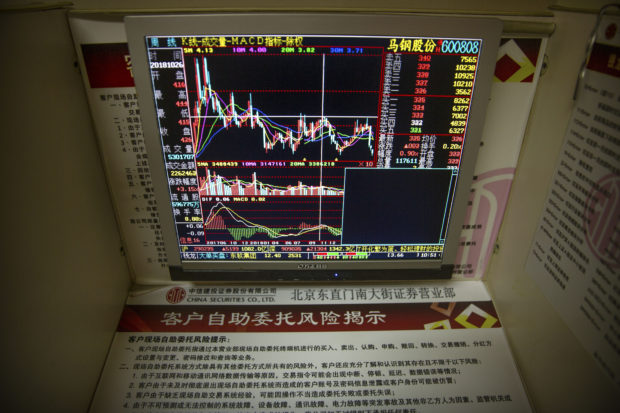TOKYO – Global stock markets were mostly higher on Friday in volatile trading as investors appeared to hope that the United States and China might yet reach a deal to solve their escalating trade war.
France’s CAC 40 gained 1.0% to 5,3634, while Germany’s DAX added 1.2% to 12,121. Britain’s FTSE 100 rose 0.5% to 7,244 after some upbeat first quarter growth figures. U.S. shares were set to open lower, with Dow futures slipping 0.1% and S&P 500 futures shedding 0.3%.
The Shanghai Composite index surged 3.1% to 2,939.21 while the A-share index in the smaller market of Shenzhen jumped 3.8%. Traders said that was mainly because Chinese institutional investors stepped up buying to support the country’s financial markets.

A computer terminal displays stock information at a brokerage house in Beijing, Friday, May 10, 2019. Asian shares were mostly higher Friday but benchmarks in Shanghai and Hong Kong gave up earlier strong gains amid uncertainty over the potential outcome of trade talks between China and the U.S. (AP Photo/Mark Schiefelbein)
China’s Commerce Ministry said would take unspecified “necessary countermeasures” after the Trump administration raised duties on $200 billion of Chinese imports to 25% from 10%. The action came as trade negotiations were underway in Washington.
“Investors are still clinging to the hope that the U.S. and China will eventually manage to agree some sort of deal,” analysts at financial firm Rabobank said in a commentary.
Hong Kong’s Hang Seng gained 0.8% to 28,550.24, while Japan’s Nikkei 225 slipped 0.3% to finish at 21,344.92. Australia’s S&P/ASX 200 rose nearly 0.3% to 6,310.90. South Korea’s Kospi gained 0.3% to 2,108.04 and India’s Sensex edged 0.3% higher to 37,681.09. Shares fell in Taiwan but recovered in Thailand.
Analysts said China could raise tariffs on some U.S. exports, though the amount would not match the costs imposed by the increase in U.S. import duties. It could step up interference in U.S. companies’ deal-making and other areas.
The increased tensions, if not resolved soon by a deal between Beijing and Washington, could hurt growth across the region and beyond, said Rajiv Biswas of IHS Markit.
“The escalating U.S.-China trade war adds to significant existing headwinds already facing the Asia-Pacific region from a range of factors, including the sharp slowdown in global electronics new orders and weak new orders in the eurozone manufacturing,” Biswas said.
ENERGY: Benchmark U.S. crude rose 33 cents to $62.03 a barrel in electronic trading on the New York Mercantile Exchange. It dropped 0.7% to settle at $61.70 per barrel overnight. Brent crude, the international standard, added 42 cents to $70.81 a barrel.
CURRENCIES: The dollar inched up to 109.79 Japanese yen from 109.77 yen. The euro strengthened to $1.1232 from $1.1216. /g

